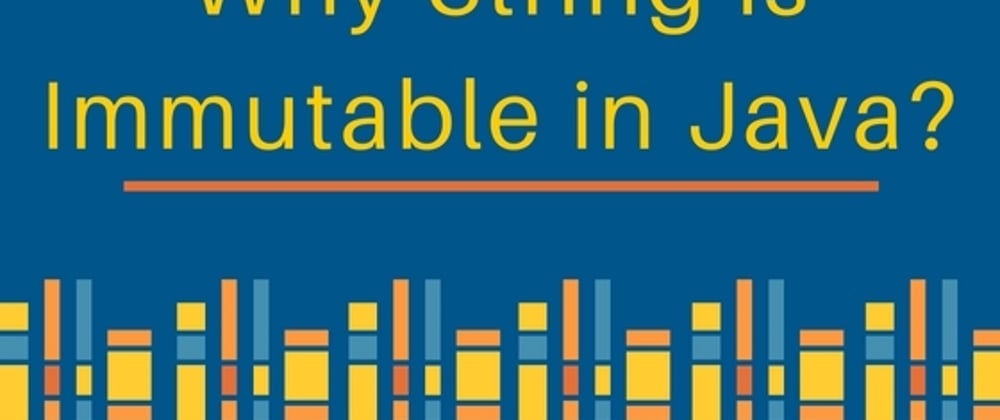Why Are Strings Immutable in Java? Important Knowledge for Programmers
Why Are Strings Immutable in Java? Important Knowledge for Programmers
Blog Article
What Is Unalterable Strings and How It Works
In the realm of programs, comprehending the principle of unalterable strings is paramount for producing safe and secure and robust applications. Unalterable strings refer to strings that can not be altered after they are developed, making certain data stability and predictability within the code.
The Essentials of Immutable Strings
Immutable strings, as a basic concept in shows, are character series that can not be changed once they are developed. This suggests that once a string is designated a worth, that value can not be altered. In languages like Python and Java, strings are immutable things, resulting in various ramifications in terms of memory management and data honesty.
One of the crucial benefits of immutable strings is that they give a complacency in information control. Considering that the web content of an unalterable string can not be changed, it ensures that the initial information remains undamaged, minimizing the danger of unplanned changes during program implementation (Why are strings immutable in Java?). This residential or commercial property also streamlines debugging procedures, as programmers can trust that when a string is specified, its value will not be inadvertently altered
Moreover, immutable strings promote effective memory usage. When a new string is developed based on an existing one, as opposed to customizing the original string, the brand-new worth is kept independently. This strategy improves performance by lowering memory fragmentation and streamlining memory appropriation procedures. Generally, recognizing the essentials of unalterable strings is critical for mastering shows principles and optimizing code effectiveness.
Benefits of Immutable Strings
Structure upon the security and effectiveness benefits of unalterable strings, their benefits reach enhancing code integrity and streamlining concurrent shows tasks. By being immutable, strings can not be changed after creation, which gets rid of the threat of unintended modifications in the information they store. This intrinsic immutability ensures that once a string is produced, its value remains continuous throughout the program's execution, lowering the chances of pests triggered by unexpected modifications.
In addition, unalterable strings add to code integrity by making it less complicated to reason about the state of a program. Considering that strings can not be altered, developers can rely on that a string will certainly always hold the very same worth, streamlining debugging and upkeep efforts. This predictability results in more dependable and secure codebases.

Application in Programming Languages
Within numerous programming languages, the consolidation of unalterable strings is a basic aspect that affects just how information is managed and adjusted within code frameworks. The application of unalterable strings varies throughout various shows languages, with each language providing its very own systems to support this principle.

On the other hand, languages like C and C++ do not have integrated assistance for immutable strings. Programmers in these languages need to by hand execute immutability by implementing regulations within their code to protect against straight alterations to string things.
Finest Practices for Dealing With Unalterable Strings
When taking care of unalterable strings in programs languages like Java and Python, adhering to finest techniques makes sure secure and efficient information adjustment. Among the essential best methods is to utilize StringBuilder or StringBuffer rather of straight adjusting strings, especially when handling substantial concatenation operations. These courses give mutable choices for string control, assisting to stay clear of unnecessary memory appropriations and improving performance.
Furthermore, when functioning with delicate data such as passwords or API secrets, it is essential to prevent storing them as plain text in immutable strings. Using protected storage devices like char selections or specialized collections for taking care of delicate info helps reduce safety risks linked with immutable strings.
Real-world Applications and Instances
Discovering useful applications original site of unalterable strings in various markets discloses their significant effect on information honesty and system reliability. In the medical care industry, immutable strings play a vital role in ensuring the protection and confidentiality of patient information. By avoiding unapproved modifications to delicate info such as medical documents and prescriptions, unalterable strings assist preserve conformity with strict personal privacy policies like HIPAA.
Banks likewise gain from the immutable nature of strings to boost the security of consumer data and purchase documents. Unalterable strings assist stop fraud and unapproved changes to economic info, providing a robust protection versus cyber threats and making certain the depend on and self-confidence of clients.

Conclusion
Finally, unalterable strings are fixed and stable series of characters that use benefits such as string security and improved efficiency in programs. They are carried out in numerous programming languages to make sure information stability and safety. Best methods for collaborating with immutable strings include preventing straight modifications and making use of approaches that return brand-new string things. Real-world applications of unalterable strings include data file encryption, caching, and string manipulation tasks.
Immutable strings refer to strings that can not be altered after they are developed, guaranteeing data stability and predictability within the code. When a new string is created based on an existing one, rather than changing the original string, the brand-new value is stored separately.In languages like Java and Python, strings are unalterable by default, meaning that when a string object is developed, its value can not be changed - Why are strings immutable in Java?. Ideal techniques for functioning with immutable strings include staying clear of straight adjustments and utilizing approaches that return brand-new string objects. Real-world applications of immutable strings consist of data encryption, caching, and string adjustment jobs
Report this page